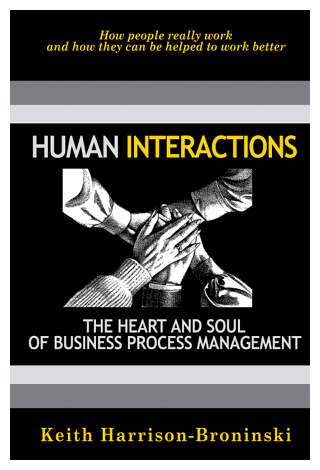AI for local social business
Supplier to UK government under Digital Outcomes 6 and G-Cloud 13
Projects
We use collaboration theory for social good
Human Interactions (published 2005)
The ground-breaking theory of collaborative work across organisational boundaries. Amazon (UK) Amazon (US)
"Set to produce the first fundamental advances in personal productivity since the arrival of the spreadsheet" ( Information Age)
"The breakthrough that changes the rules of business" ( Peter Fingar, author of "Business Process Management: The Third Wave")
"The overarching framework for 21st century business technology" ( BP Trends)
"The next logical step in process-based technology" ( Chair of the Workflow Management Coalition)
Subsequent books to which Keith Harrison-Broninski contributed material on Human Interaction Management include:
"In Search of BPM Excellence" (2005, Meghan-Kiffer Press)
"Business Process Management Handbook, 1st edition" (2010, Springer)
"Social BPM" (2011, Workflow Management Coalition)
"How Knowledge Workers Get Things Done" (2012, Workflow Management Coalition)
"Empowering Knowledge Workers" (2013, Workflow Management Coalition)
"Business Process Management Handbook, 2nd edition" (2014, Springer)
Coming soon is Keith's new book "Supercommunities", which brings together insights from recent academic research with original ideas about wellness, collaboration, and finance to explain how communities everywhere can become antifragile through social trading.
NHS GATHER (2010-14)
Reinvent the NHS. Not the wheel.
A strategic NHS service for replication of successful healthcare innovations (Gartner Cool Vendor and NHS Innovation Fund award). Sponsors of the NHS GATHER service created their own showcase of Innovation Guides for specific clinical needs and/or regional communities to enable take-up of step change innovations:
Cheaply by reducing the manual effort required to communicate innovations to stakeholders
Safely by providing a standard basis for implementation of innovations
Widely by using social media to share innovations
Quickly by making it easy for stakeholders to understand innovations
Town Digital Hub (2015-2017)
Manage life issues with local help
The free web platform for volunteer supported wellness planning:
Help others learn to self-manage their wellness
Show people how to create a holistic wellness plan from local resources and share it with their personal support network
Stakeitback - Prototype App (2018-2019)
A disruptive mechanism for funding small businesses, including projects that benefit society
Stakeitback lets you use some of your money to support small projects you believe in, rather than investing in savings accounts, bonds, equities, or other capital markets.
As well as doing good and being ethical this is also a sensible financial choice, since returns from small projects are often high and risks easily estimated.
Social Echoes (2020-2021)
Great, replicable social trading ideas
Communities around the world are facing up to equality and sustainability issues by building local ecosystems based on social value.
Social Echoes gathers inspirational social trading ideas that could be replicated in other communities, either manually or using our Web platforms for social trading, Town Digital Hub and Stakeitback.
We feature great social businesses with the aim of encouraging community based trading everywhere.
Supercommunities (published 2021)
How communities everywhere can become antifragile through social trading
Keith Harrison-Broninski's new book "Supercommunities" brings together real community stories with insights from academic research and original ideas about wellness, collaboration, and finance to explain how communities everywhere can become antifragile through social trading.
Explainable, reliable AI chatbots (2023-)

Internet of Communities
(watch this space)
We are increasingly realising how current online infrastructure is unfit for purpose, particularly with regard to managing trust and empowering the creation of social value. The ideas in Supercommunities enable the creation of a new social layer of Internet technology that enhances how individuals and organisations manage their identity online.
The basic idea of the Internet of Communities is to replicate online the way in which we interact offline. In the real world, people and organisations establish trust by sharing information about the communities (geographical and other) to which they belong, along with the contributions to and uses made of the capitals of those communities. This creates an incentive to make such contributions, which builds virtuous circles of social engagement.






